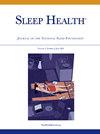睡眠不足与注射吸毒者死亡率的关系。
IF 3.4
2区 医学
Q2 CLINICAL NEUROLOGY
引用次数: 0
摘要
背景:在普通人群中,睡眠不足与全因死亡率有关。使用药物会对睡眠产生不良影响,而失眠症状在艾滋病病毒感染者中很常见。因此,注射吸毒者因睡眠不足而导致不良后果的风险可能会增加。我们评估了长期社区队列中注射毒品者睡眠不足与死亡率的关系:参与者来自美国马里兰州巴尔的摩市的注射吸毒者队列 "艾滋病与静脉内体验相关联(ALIVE)研究"。从 2005 年到 2020 年,每半年通过调查对感知的睡眠充足度和持续时间进行一次评估。死亡率数据通过与国家死亡指数加号(National Death Index-Plus)的链接获得。死亡原因由三位医生独立鉴定和验证。使用考克斯回归法评估了全因和特定原因死亡率的危险性,并考虑了重复测量:共纳入 2633 名参与者,入选时的中位年龄为 45.8 岁;32.5% 为女性,75% 为黑人。在对人口统计学、心理健康和合并症进行调整后,睡眠不足与全因死亡的相关性增加了 32%(危险比:1.32,95% 置信区间:1.12-1.55),与 HIV/传染病相关死亡的相关性增加了 67%(危险比:1.67,95% 置信区间:1.15-2.42)。短(结论:睡眠对注射吸毒者的长寿起着至关重要的作用。需要开展研究,以确定针对睡眠的干预措施是否能改善注射吸毒者的健康和寿命。本文章由计算机程序翻译,如有差异,请以英文原文为准。
Association of inadequate sleep with mortality among persons who inject drugs
Background
Inadequate sleep is associated with all-cause mortality in the general population. Substance use has adverse effects on sleep, and insomnia symptoms are common among people with HIV. Therefore, persons who inject drugs may face a heightened risk of adverse outcomes from inadequate sleep. We evaluated the association of inadequate sleep with mortality among persons who inject drugs in a long-standing community cohort.
Methods
Participants were from the AIDS Linked to the IntraVenous Experience (ALIVE) study, a cohort of persons who inject drugs in Baltimore, Maryland, USA. From 2005-2020, perceived sleep adequacy and duration were assessed semiannually using survey. Mortality data were obtained through linkage to the National Death Index-Plus. Cause of death was independently characterized and validated by three physicians. Hazards of all-cause and cause-specific mortality were evaluated using Cox regression accounting for repeated measurements.
Results
A total of 2633 participants were included, with a median age at entry of 45.8 years; 32.5% were female, and 75% were Black. After adjustment for demographics, mental health, and comorbidities, inadequate sleep was associated with a 32% greater hazard of all-cause mortality (hazard ratio: 1.32, 95% confidence interval: 1.12-1.55) and a 67% greater hazard of HIV/infectious disease-related deaths (hazard ratio: 1.67, 95% confidence interval: 1.15-2.42). Short (<6 hours) and long (≥8 hours) duration of sleep were both associated with higher hazard of all-cause and chronic disease-related mortality (all p < .05).
Conclusions
Sleep plays a critical role in longevity in persons who inject drugs. Research is needed to determine whether interventions targeting sleep improve health and longevity in persons who inject drugs.
求助全文
通过发布文献求助,成功后即可免费获取论文全文。
去求助
来源期刊

Sleep Health
CLINICAL NEUROLOGY-
CiteScore
6.30
自引率
9.80%
发文量
114
审稿时长
54 days
期刊介绍:
Sleep Health Journal of the National Sleep Foundation is a multidisciplinary journal that explores sleep''s role in population health and elucidates the social science perspective on sleep and health. Aligned with the National Sleep Foundation''s global authoritative, evidence-based voice for sleep health, the journal serves as the foremost publication for manuscripts that advance the sleep health of all members of society.The scope of the journal extends across diverse sleep-related fields, including anthropology, education, health services research, human development, international health, law, mental health, nursing, nutrition, psychology, public health, public policy, fatigue management, transportation, social work, and sociology. The journal welcomes original research articles, review articles, brief reports, special articles, letters to the editor, editorials, and commentaries.
 求助内容:
求助内容: 应助结果提醒方式:
应助结果提醒方式:


